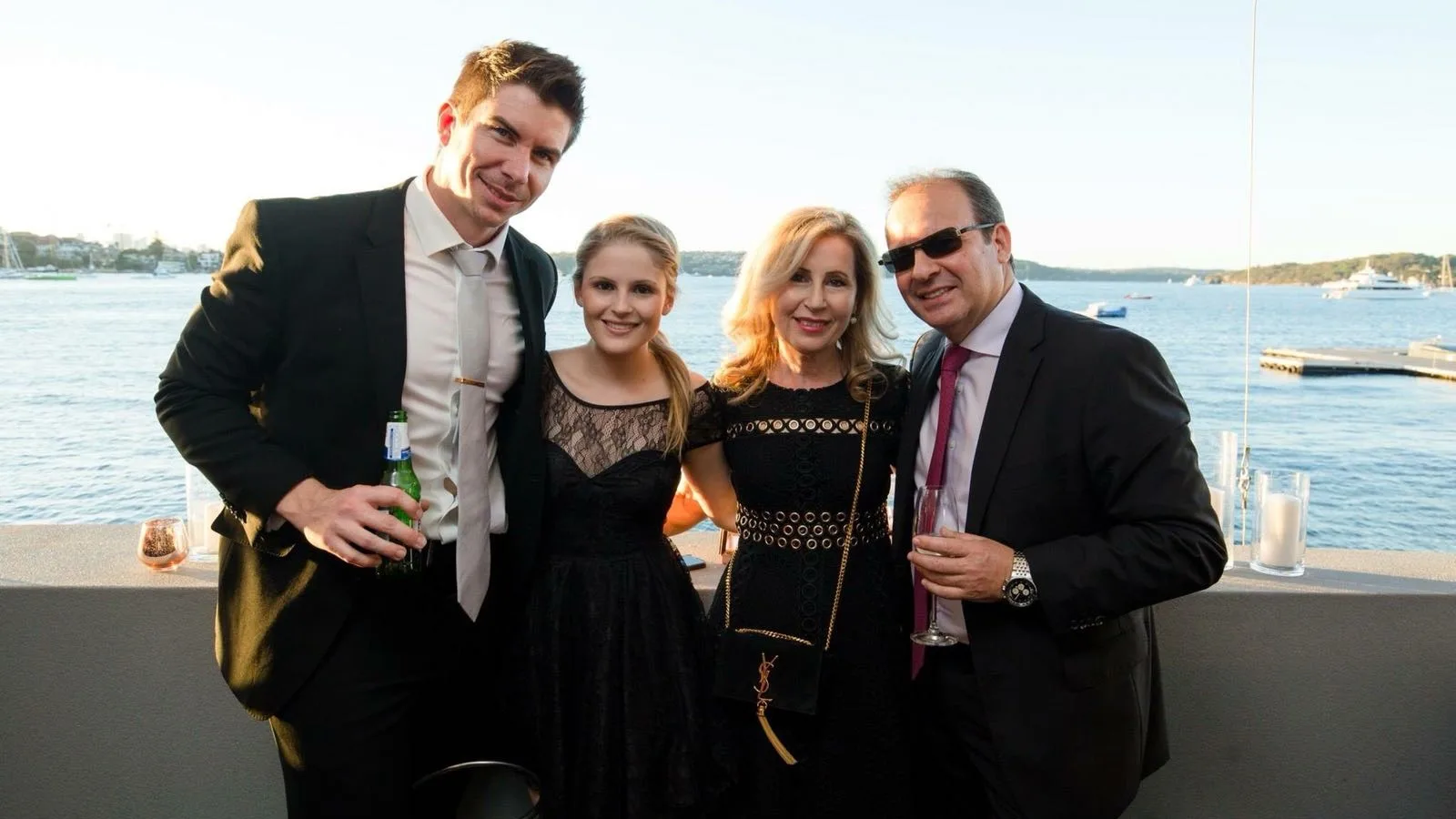White Pearl Foundation and Cquence Foundation, ACNC registered charities, together with a small team of passionate volunteers, have announced the Golden Era Gala function to be held at the Hyatt Regency Sydney on Saturday, November 30.
What began as a reunion of friends celebrating the Golden Era of the ‘70s and ‘80s has evolved into a community-wide fundraising event supporting two incredible charities dedicated to funding research and support programs for patients with brain and other rare cancers.
Ahead of the event, The Greek Herald spoke with founder of the White Pearl Foundation, Suzane Peponis-Brisimis, and Director at Cquence Foundation, Peter Kaliaropoulos, to find out more.
What inspired the idea to transform a simple reunion into a large-scale fundraising event for cancer research and support?
Whilst we wanted to reunite and celebrate the wonderful times we had in the ’70s and ’80s, we realised that a number of good friends we grew up and went to school with, are sadly no longer with us. Cancer caused some of our friends to be lost much sooner than we ever imagined as teenagers.
We are reuniting to remember the “Golden Era” of the ’70s and ’80s and to unite against cancer to support two charities dedicated to funding cancer research and support programs for patients with brain and other rare cancers.
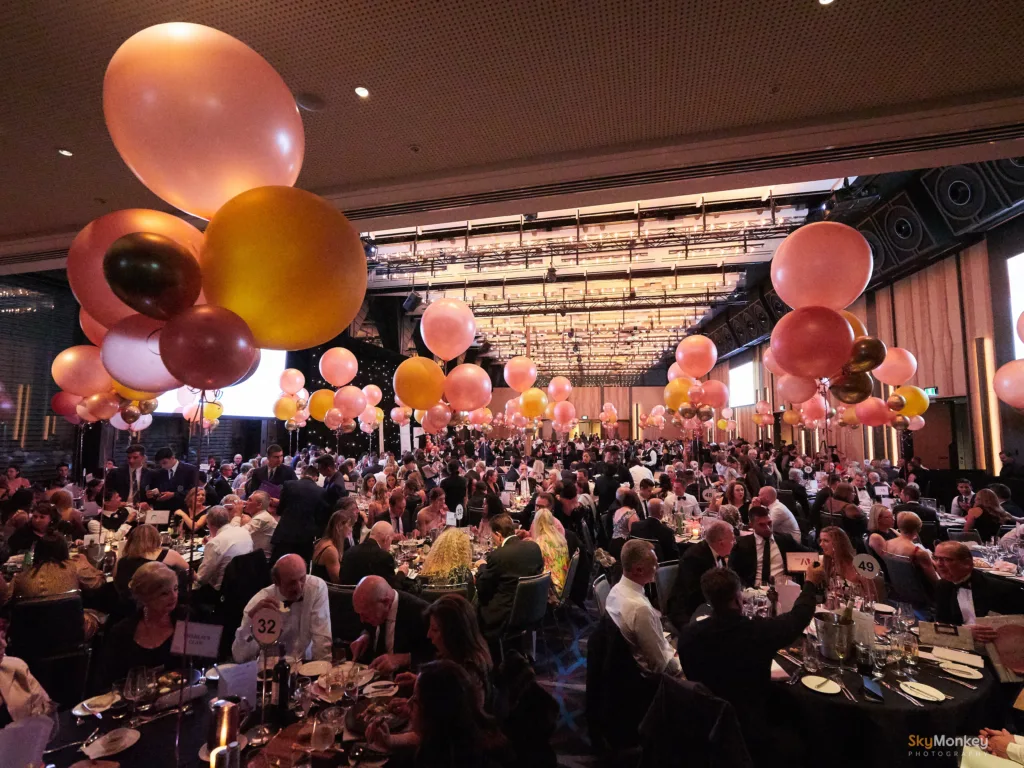
Can you share more about the specific programs and research initiatives that the funds raised from this event will support?
White Pearl Foundation will donate 100% of the funds raised at this event to the research pillar of The Brain Cancer Group (TBCG).
TBCG conducts both pre-clinical and clinical research on the Royal North Shore Hospital campus in St Leonards. The TBCG initiative we will support is a vital, Australasia-first Imaging Laboratory that has been curated and led by TBCG’s Associate Professor Michael Back.
Established in late 2021 to develop a program of research and teaching in neuro-oncology, it embraces the dawn of quantitative MRI and molecular era of medical imaging, to empower oncologists to tailor personalised neuro-oncology treatments. The Imaging Laboratory is now leveraging Artificial Intelligence methods in neuro-imaging to improve diagnostic decision making and disease monitoring.
The program comprises four primary domains: (1) Clinical Trials, (2) Imaging Workflows, (3) Technical Development, and (4) Education. This work cannot be done in a silo, and the researchers continue to develop national and international research collaborations. The lab is involved in multi-institutional projects and is also active in neuro-imaging research in multiple domains beyond brain cancer.
Currently focusing on the Clinical Trials arm to develop a personalised precision medicine approach, researchers are exploring ways to improve brain cancer imaging across the patient journey thanks to their attachment to one of Australia’s busiest neuro-oncology treatment centres. The Centre has access to high fidelity MRI scanners at North Shore Radiology and state-of-the-art body PET scanner at RNSH/ University of Sydney. Patients treated by TBCG consultants already have access to advanced imaging with 2-HG spectroscopy, DSC/DCE perfusion, task-based functional MRI, preoperative DTI and FDG/FET PET. You can find out more about TBCG Imaging Lab here.
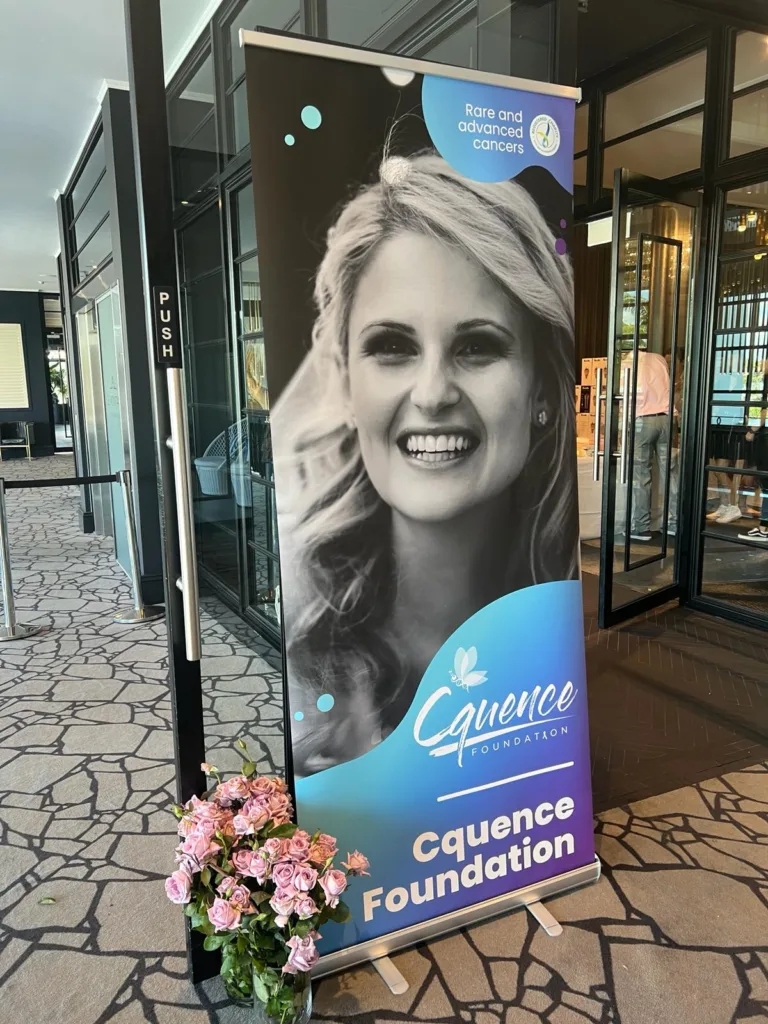

Cquence Foundation’s aim is to provide cancer patients, carers and their families a small ray of hope by:
- Helping subsidise molecular and genomic testing for rare and/or advanced cancer patients, which may lead to other treatment options.
- Generating awareness of testing options, as well as other personalised integrative treatments for cancer patients.
- Advocating and lobbying government bodies to help fund genomic testing and subsequent PBS approved medications.
- Helping rare and/or advanced cancer patients navigate the complexities of testing via arranging and funding “second opinions” with experts in the patient’s cancer and driver mutations.
Cquence Foundation will donate 100% of the profit received from this event to the Prince of Wales Hospital, Cancer Survivorship Centre in Randwick. The Centre provides a range of evidence-based and research-driven cancer survivorship programs and services to support the health and well-being of people living with and beyond cancer.
How did White Pearl Foundation and Cquence initially connect to collaborate on this initiative?
The idea about a Re-union Gala Event originated with two mutual friends, Chris Tsioulos and Andrew Smyrnis, who have been known to us since the mid-70s. They were aware that both charities were founded following the loss of two very dear persons in our respective families – a mum and a daughter. They approached us with kindness and care and suggested that the re-union should not just be a celebration, but also help with cancer-related causes. Both White Pearl and Cquence Foundations were grateful for their consideration and started collaborating on the event as one team.
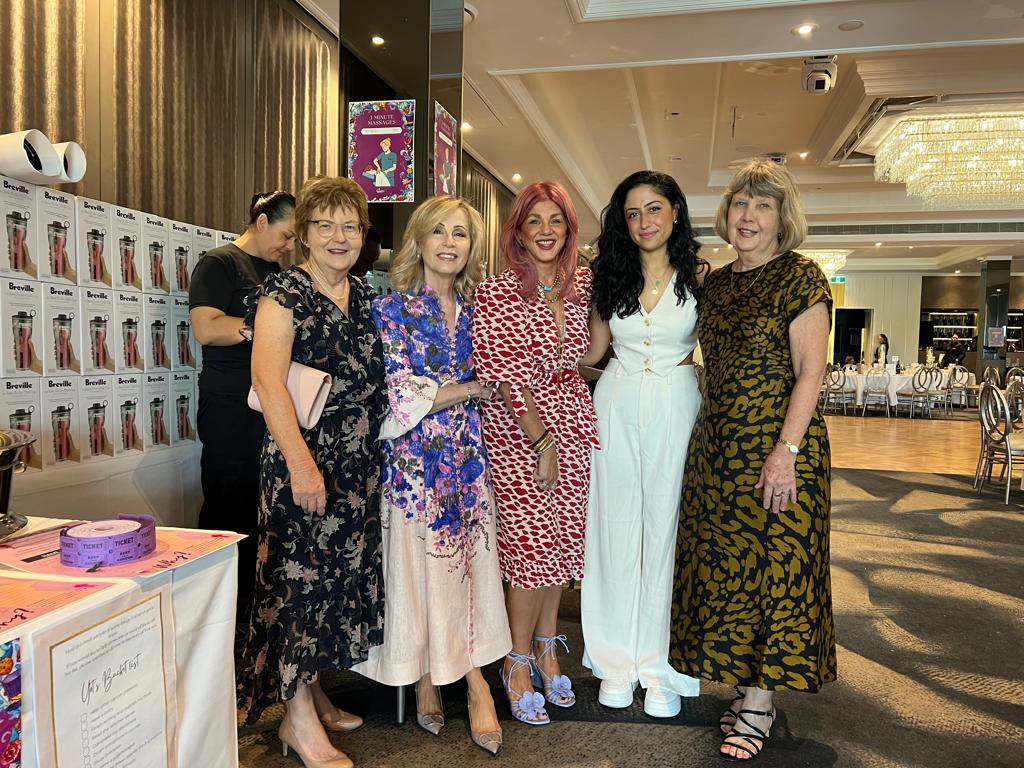
What are some of the key challenges that patients with brain and rare cancers face, and how do your organisations aim to address these?
Brain cancer remains an understudied disease with low survival rates that have barely improved in over two decades. It is, in fact, a rare cancer.
According to canceraustralia.gov.au, in Australia in 2023, it is estimated that there were 1,924 new cases (1,183 males and 741 females) and this represents 1.2% of all new cancer cases in our country.
Some sobering facts:
- Brain cancer is the leading cause of cancer deaths in children under 15 and accounts for more than a third of cancer deaths in children aged under 10.
- Brain cancer is the leading cause of cancer death in young adults under 39 years of age.
- Brain cancer is the second biggest cancer killer of females 0 – 44 years of age (behind breast cancer).
- The most common malignant brain cancer, high-grade glioma (HGG), is almost 100% fatal.
- Brain cancer is one of the most under-studied of all cancers yet receives very little research funding.
- No risk factors have been identified and no screening procedures are in place.
- Current therapies are often ineffective and have debilitating side effects.
- Some brain cancers infiltrate the brain and migrate quickly away from the primary tumour, making them extremely difficult to treat.
- Effective treatment options for brain cancer patients are limited, tumours are developing resistance to standard therapies.
- Lifetime financial cost to patients and families is very high.
Central to the work of the White Pearl Foundation is raising awareness of these challenges faced by brain cancer patients and carers. Most importantly, the need to fund research and support patients through their journey, as the disease takes a very heavy toll on the patient and family. TBCG, the charity the White Pearl Foundation supports, is run by doctors who recognised this toll and employed a Nurse Practitioner to guide and support patients for their entire journey. A critical resource, the family’s scaffold, funded by community through fundraising events such as this one.
These patients have stood largely alone in a community that focused much of its fundraising and awareness on other more common cancer types. Research is key. Raising funds and advocating for patients to government and community remains the focus of the White Pearl Foundation.
Cquence Foundation has discovered that when it comes to rare and advanced cancers in Australia, the path patients walk tends to be more complicated. Many patients face the disheartening reality of inequity in survival outcomes, limited experts and treatment protocols. This also translates into increased associated costs, often burdening families with prohibitive out-of-pocket expenses.
Cquence aims to make their journey a little bit easier when they need it the most. We are dedicated to assisting patients, their caregivers, and families in their battle against rare and advanced cancers. Every cancer patient deserves the chance to access the best possible treatment options, regardless of the rarity or complexity of their condition.
Cquence is helping to subsidise out-of-pocket comprehensive genomic testing for rare and/or advanced cancer patients, which may lead to other treatment options. Such support also helps create hope through science for cancer patients.
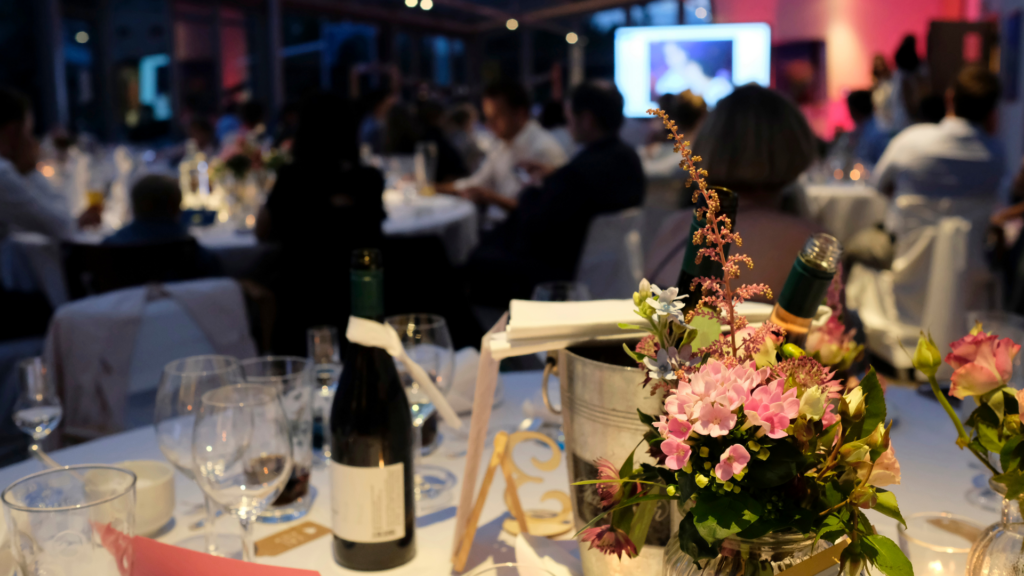
The Golden Era Gala brings together a wide array of influential attendees. How do you see their involvement furthering the cause?
It is estimated that currently over one million Australians are living with a cancer diagnosis and that almost two in five Australians will be diagnosed with cancer before their 85th birthday. We need to create awareness and seek support from many Australians so research efforts can intensify and extend support through cancer survivorship programs. Respected and influential people are supporting fundraising efforts and assist in creating awareness in understanding the impact cancer causes and opportunities to mitigate its effect and extend life for many diagnosed with this illness.
In what ways do you hope this event will raise awareness for the challenges of rare and brain cancers in the wider community?
Education and research are key to addressing rare and brain cancers. Professor Boon Chua (Prince of Wales Hospital) and Dr Drummond (The Brain Cancer Group) will offer insights during their presentations at the event, and their key messages will resonate with many attendees and others who may learn about their initiatives from the press and social media.
How important is the event’s theme of the ’70s and ’80s to creating a memorable experience, and what can attendees expect from the evening?
For most of us attending the event, the ’70s and ’80s were some of the best years of our lives as we realised many years later. We were young, adventurous, full of energy to explore everything wonderful life had to offer us. We formed long-lasting relationships and experiences through our participation in Greek dances and socialising at discos… music and dancing coupled with a care free attitude, characterised that era and our lifestyle.
People attending the event can expect to reconnect, reunite with some of their friends, and recall the days that disco and bouzouki complimented each other.
Could you describe the impact you’ve seen from past fundraising events on the lives of cancer patients and their families?
Hope is the first word that comes to mind. Given that brain cancer has a poor prognosis, while at the same time we are witnessing enormous advances in other areas of medicine, our focus on funding research provides real hope, that in time, brain cancer patients will be afforded the same increased survival rates currently offered to patients with conditions that have been better funded through the efforts of community and government.
The White Pearl Foundation raising awareness and funds to drive the necessary research, has brought much comfort to our event attendees, in particular, patients and carers. This is commented on by many. They feel supported and they feel heard in an environment with like-minded people.
Aware that not much government funding reaches brain cancer researchers, patients and families express gratitude for the research salaries, PhD programs, lab equipment and seed funding for new projects that the White Pearl Foundation continues to fund, with the ultimate goal to advance better treatment outcomes and see a cure.
As Cquence is supporting a number of rare cancer patients, when it funds genomic tests, patients and their families express gratitude, relief and hope. Some financial assistance certainly helps mitigate the stress in most rare cancer cases, as some tests and medications are not covered by PBS and involve tens of thousands of dollars, sometimes on a monthly basis. Patients and their families also realise there may be some pathways to alternative treatments as a result of comprehensive genomic testing and often this leads to hope for a better outcome. Hope through this cutting-edge science and research is where we see a real difference in survivorship outcomes for patients.
How did the partnership with Mars Group come about, and how has their support contributed to the Gala’s mission?
Mars Group founder and Chair, Greg Gav, has also been an alumni from All Saints Greek School since the early ’70s and known to many of us since that time. He also has lost a number of friends and colleagues to cancer. When approached to support such an event as a main sponsor, there was no hesitation. Without support from Mars Group and all other sponsors, events such as this re-union are simply not possible today. Our sponsors not only help offset some significant costs associated with staging such events, but also help to communicate to other friends, family, colleagues and to the community at large, what the charities goals and aspirations are in supporting cancer research and cancer care programs.
For those unable to attend, are there other ways they can contribute or get involved with White Pearl Foundation and Cquence?
White Pearl and Cquence Foundations always welcome support from friends, colleagues and the wider community. Such support may be in the form of a donation or volunteering for a future fundraising event, or referring a cancer patient for support. Every bit of help is always valued. Both charities forward 100% of net proceeds from all fundraising activities to The Brain Cancer Group, research pillar and the Prince of Wales Hospital, University of Newcastle and other reputable research institutes and hospitals.
Please go the respective websites of the two foundations to discover ways of helping.
Event Details:
- Date: Saturday, 30 November 2024
- Time: 6:30 PM
- Dress Code: Formal or ‘70s / ‘80s Attire
- Venue: Maritime Ballroom, Hyatt Regency Sydney 161 Sussex Street
- Tickets: $250 per person+ small booking fee
- More details: https://events.humanitix.com/golden-era-re-union
